Documentary : Foodstuff
![]()
The onion master’s farming club Seeds for tomorrow’s agriculture
DC262111![]()
寅ちゃんと6年1組農業部 [TUY]
![]()
![]()
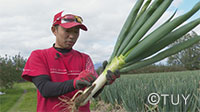
|Length : 46min |Year : 2021 |
A red hat and red t-shirt. Characters on the back say he's an "Onion Master."
Tsuyoshi Shimizu, the Onion Master, is 38 years old. His incredible Welsh onions— “sweeter, thicker, and softer than fruit” —have reached sugar levels of up to 22.5 degrees.
As determined as Tsuyoshi Shimizu is to create his own ultimate Welsh onion, the declining number of farmers in Japan has not escaped his attention. He believes that the best way to solve this problem is to get more people aware of agriculture.
Fortunately, Tsuyoshi Shimizu happened upon the chance to teach sixth graders of Terazu Elementary in Yamagata Prefecture’s Tendo City about agriculture. He suggested that they go beyond the simple farming curriculum in public education, which cannot foster true understanding or enjoyment of agriculture, and organize an extracurricular farming club, in which children would get the real farming experience.
And so, in the spring of 2019, he served as the guide to 19 sixth-grade members of a Farming Club, bringing real farming experience to kids. Kids would undertake everything from the sprouting, planting, cultivation, harvest, and even sales of produce. Through this new undertaking, they gained independence and new outlooks on agriculture.
See the efforts of a Welsh onion farmer looking to change all Japan’s agriculture, and what 19 hard-working sixth-graders manage to produce in this total coverage documentary.
The Passionate Dietitian’s School Lunch ~The Secret Behind the Delicious Dishes~
DC261710![]()
熱血栄養士!おいしい給食のヒミツ [HBC]
![]()
![]()
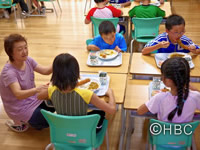
|Length : 47 |Year : 2017 |
In the town of Oketo in Hokkaido, Japan, population 3,000, there exists a delicious school lunch. The person behind it all is Tomi Sasaki, a registered dietitian who wishes to teach proper eating habits to children. Over her career of nearly 40 years, Tomi has gone above and beyond the average school lunch director. She visits local producers to select ingredients herself and even ventures out into the woods to harvest fresh vegetables. Some items on her menu include fish served without the bones removed and authentic curry that even an adult would find spicy. Her unyielding passion to have children try a variety of foods is what drives her to create school lunch from scratch using local ingredients.
Tomi, now almost 60, is nearing retirement. As we follow Tomi’s final days leading up to her retirement, we discover the essence of eating, a necessity shared by all people.
Eatrip Encountering Japan’s Food and People: Kitami City “Bridging the Past with the Future”
DC261509![]()
Eatrip~北海道・おいしい一人旅~ [HBC]
![]()
![]()
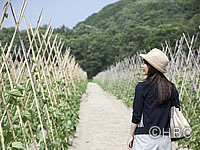
|Length : 23min |Year : 2015 |
Revel in the exquisite scenery. Engage in striking conversations with the locals. And indulge in the cuisine created from the offerings of the abundant nature.... This program takes you on a journey for local cuisine of Kitami in Hokkaido.
Embarking on the adventure is Hokkaido-based picture book author SORA. At the end of the trip, SORA creates a scrapbook using her own photos and drawings to reflect on her discoveries and thoughts.
Join SORA on her trip around Hokkaido and immerse yourself in the beautiful scenery of the land.
Raising Children with Local Food: “Dietary Education” at a Nursery in Hokkaido
DC261308![]()
北海道まるごといただきま~す わんぱく保育園の食育日記 [HBC]
![]()
![]()
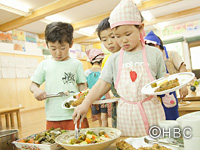
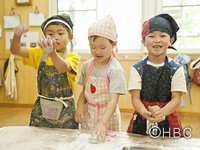
|Length : 46min. |Year : 2013 |
Two adults enroll for a day at a nursery school in Otaru City, Hokkaido.
Education critic Naoki Ogi, also known as Ogi Mama, has become a familiar face on Japanese television, loved for his gentle tone of speech. The main character of the popular TV school-drama series "Kinpachi Sensei" is based on Ogi Mama, as he was once a passionate teacher who always confronted his students.
Partnering Ogi Mama is Naoki Tanaka of the popular comedy group Kokoriko. As a father who is very involved in raising his two sons, Tanaka always walks his kids to kindergarten when he can.
The two Naokis visit NPO Kamome (Seagull) Nursery School in Otaru City.
The biggest feature of the nursery school is its unique dietary education, which aims to nurture the pupils both physically and emotionally. What do the pupils there have for lunch, or for snacks? And how are kids raised on this dietary education different from those who are not?
At this nursery school, sardines that have been cut up and fried in the school kitchen are served, and they come with the bones too! Nowadays in Japan, many food products are advertised as being delicious on the grounds that they are "very soft", but at this nursery school, "softness" is anything but the priority! The motto here is to chew hard foods thoroughly, for chewing well is not only important for the development of the jaw and the body in general, but is also of the utmost importance for a child to develop a sound mind. There are experts who say that kids who chew well do not "lose control".
Right after arriving, the two Naokis tag along the kids to go pick Yomogi buds, for on this day, the snack is Yomogi rice cake, which features the rich aroma of spring!
Meanwhile, at the nursery school kitchen, fried fish using herrings—which are in season—is being prepared. Chopped up Fuki leaves are mixed in the breading that is used for the fried fish. Also on the menu is a stew of Shiitake mushrooms—which the kids grew themselves—with some pickled radish.
Seagull Nursery School emphasizes the importance of being local and eating local food. In summer, the kids heap up mulberry jam on home-made bread; during fall, the season of harvest, the class of five-year-olds makes Soba noodles, tofu, curry with rice, and even pickled herring, all from scratch! By cooking for the younger kids, the class learns the true value of words like "it is delicious!" and "thank you!"
During summer, the kids leave their usual school grounds to spend two summer months at their school building by the beach (called "Seagull by the Sea"). There, the kids spend all day swimming in the sea and running on the sandy beach. Come winter, the nursery school borrows a hut on a mountain from a university mountaineering club. There, the kids sled and play in the snow all day long.
The kids sew their own dust cloth; they braid their own jump rope.
The education offered here is one that develops the kids' strength to live vigorously.
"I ate something I had thought I didn't like, but when I did, it tasted so good!"
"I chewed some hard food really well, and then its taste spread in my mouth!"
"I did it!" "There's nothing you can't do if you work hard for it!"
The pupils infinitely broaden their possibilities through the dietary education offered here.
What is dietary education?
You might discover that the answer to that question has more to it than you think! Watch this program and find out!
Eihei-ji Temple : Preparing the Food of Life
DC261207![]()
学びEye!永平寺に学ぶ~食の作法 [FBC]
![]()
![]()
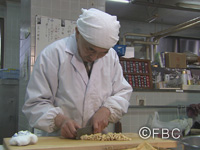
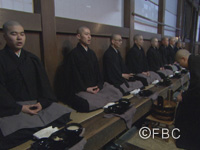
|Length : 26min. |Year : 2012 |
Deep in the snowy mountains of Japan lies Eihei-ji, the main temple of Soto Zen Buddhism.
The temple dates back nearly 770 years ago, when it was founded by Dogen Zenji as a place for ascetic training.
Around 200 monks from all over Japan engage in rigorous training at the temple.
Zen meditation and sutra chanting play an essential role. As Dogen instructed, though, cooking and eating are also part of training.
This teaching is handed down by the tenzo, the priest who takes care of all the cooking at Eihei-ji.
Despite his important position, the current tenzo Ryokyu Miyoshi still cooks in the kitchen with the trainee monks.
The camera follows tenzo Miyoshi as he prepares food at Eihei-ji.
Dogen Zenji wrote down his instructions and teachings about cooking in the tenzo kyokun, or "Book of creeds."
For example, Dogen insists all ingredients are living things, so even a single grain of rice must not be wasted.
In accordance with this, the monks at Eihei-ji try hard not to waste food, with the skin and seeds of vegetables, for instance, being reused to make soup stock.
The food is prepared from the heart with the eater in mind.
Tenzo Miyoshi believes society benefits when food is treated with more care.
This is the essence of Dogen Zenji's teachings, a lesson that continues to be passed on down through the ages.















